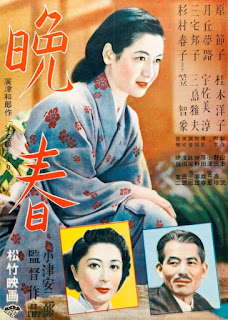Late Spring - Pinocchio Reversal
Thoughts On: Late Spring (晩春, 1949)
A father hopes for his daughter, now in her late 20s, to get married.
One of Ozu's most iconic and fervently studied films, Late Spring is a simple blessing to watch. A subtle encapsulation of his style, this film is quietly beautiful and narratively striking. In place of constantly rephrasing the term 'simplicity' in describing Late Spring, it is easier to just recognise that this is an Ozu film. I personally feel that this glacial drama is almost entirely surmised in one shot; the reversal and plot twist of the film that shows all that drama was manufactured by the father. It is in the final few minutes of Late Spring that we then understand that this is a patient unveiling of a father's intent to grow beyond himself by stepping away from feminine confines. In such, he releases his daughter, convincing her to get married. This is then a Pinocchio story with narrative reversals in the iconic Ozu style.
A father with a wish makes a dream out of a child to experience fulfilment, only to realise that it is their child who must fulfil themselves to rescue them. Ozu's poignant reversal here is that there is no hamartia, no epic, exaggerated drama. Characters are experienced, knowledgeable, and human in their reservations; a demonstration of how real life may be lived honourably, instead of honour being blundered upon. Therefore, the Pinocchio story sees a puppet son lose his way in life but figure a way back home, and into true humanity, guided by his love for his father; Late Spring sees a father guide his dependent daughter to her own home and life with love. The primary difference between Pinocchio and Late Spring is that knowledge is gained from youthful mistakes in the former, and from tradition in the latter. This is the dramatic genius that distinguishes Ozu's style so well; he finds perfection already present in the world, he doesn't need to blow a city up or lose a child at the bottom of the ocean to find it. This is what makes that narrative punch in the conclusion so powerful; we realise the father was always conscious of his story: he lost a wife and allowed his daughter to take her place, but is now tasked to allow her to become a wife and mother in her own regard. He does not force, but allows this to happen with one simple lie - that he may marry again. This lie (another reversal of the Pinocchio narrative) penetrates the heart of his daughter's internal conflicts. One can see her as feeling inadequate and indecisive in herself; apathetic in the post-war era. She has replaced her mother, but has not become one herself, and holds no heart to do so. When her father allows her to believe she may be replaced by a new wife, she first rejects the notion that she cannot replace her own mother in anger, only to realise anyone can be a mother and wife; this occurs to her when she meets the second wife of a family friend who she actually likes. In this instance, the recycling of the name and place of mother and wife stops being disgusting and unclean to her. This then allows Noriko to relinquish her self-suffocating imitation of her mother and become a true daughter, therefore a mother and wife to someone other than her father.
Her path is not too dissimilar from Pinocchio's, who lets go of his notion of being a 'real puppet' in place of becoming a true son. But what crystalises this character transformation is the father's lie. He convinces his daughter to become her own woman and take her life for herself, with his graces, by having her believe he will take a new wife when these intentions are actually false. While he lets his daughter go, there is a recognition within him here that his wife is actually irreplaceable; that only his daughter was worthy and capable of taking true care of him. So though he teaches his daughter to let go of this imago of motherly perfection and start living, we see the father also retain a romantic belief in the purity of the place of a (or rather his own) wife. There is a completeness here; a feeling that he accomplished all he wanted to as a father: to raise a good woman. He can rest in that melancholy predicament in solitary peace in the final moments of the film, which imbues the narrative with such Ozu perfection.
As with Soleil O, I watched this film on the Old Films Revival Project. Check it out if you haven't already:

.png)









